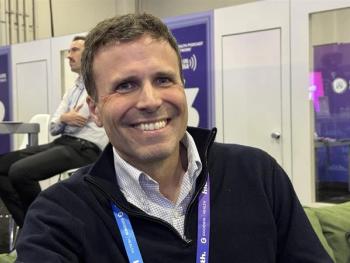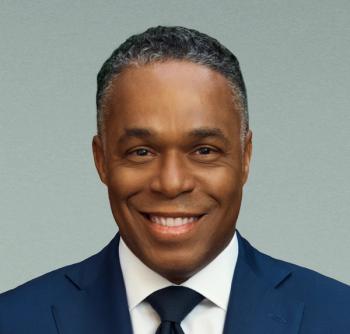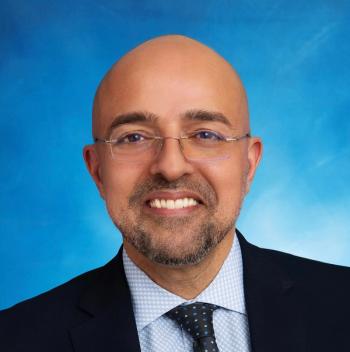
TURNING POINTS: UAB Health System's Will Ferniany, PhD, Says, "If You Put the Patient First You Will Not Make a Mistake"
In the fourth installment of the Chief Healthcare Executive™ video series Turning Points, the retiring leader of Alabama's largest academic health system discusses the need for healthcare equity and the mission to improve the health of everyone in the state.
This week, CHE welcomes Will Ferniany, PhD, CEO of the University of Alabama at Birmingham Health System (UABHS), for the fourth installment of Turning Points. Ferniany has led the 11-hospital, $5 billion system for 13 years. As the CEO of UABHS, Ferniany has spearheaded healthcare equity campaigns and expanded healthcare delivery throughout Alabama, including rural areas. He will retire at the end of the year.
This transcript is lightly edited for clarity.
Chief Healthcare Executive™: Can you describe the evolution of the health system during your tenure?
Ferniany: I've been here since 2008. I would say there's two major changes that have taken place. One is growth; we have grown from being a little over a $1 billion system to close to $6 billion, and we've grown from two hospitals to 11.
But that's not the main thing that I'm proud of—what I'm mostly proud of is the alignment. This is an academic health system, and as an academic health system, we have three missions. One is clinical, one is research, and one is education. When I got here, these were not very well aligned. Those three missions are very well aligned now. [They're] pretty much of equal importance, and in just about everything we do, we consider all three of those missions.
I'm very proud to work here at this institution, and I've always been proud of the people that work here. It's a wonderful institution in the sense that it takes every patient complaint extremely [seriously], and we have one of the highest patient satisfaction [rates] in the country. That is something I'm also proud of [that we did not have] when I got here. We have strong engagement; the health system and the university together, were voted the best employer in the country by Forbes. That's of everybody, that's of General Motors, Amazon, which is pretty amazing. We take every patient complaint very seriously and respond to it and deal with it, every one of them.
We make sure we don't do things that are what I call "gray;" we're always compliant with the law. We don't do anything that we don't want to see in the newspaper.
I'm very proud of this institution.
CHE: UABHS oversees 11 hospitals. Can you discuss how an expanding health system balances the need for quality standards across the system with maintaining the individual character of each hospital?
Ferniany: The main reason [why] we have expanded into other areas, particularly in the rural areas, is [because] the University of Alabama at Birmingham, our School of Medicine, and our health system has a responsibility to the care of the state and to the health status of the state. That's hard to implement if you're just in one location, if you're just in Birmingham. So, having other facilities throughout the state allows us to implement them.
The way we've set this system up is not a very rigid system. So, part of your question is easy to answer in the sense that we maintain the individual character and boards of all of our facilities. We work together where it's to our benefit to work together, such as in maintaining quality standards. Supply chain is a classic case where we do things together. We take the advantages on our debt ratings and stuff like that, but we don't impose. We're not like a lot of systems that are cookie cutter. Let's say we're all wrestling with whether we mandate vaccines or not right now, and if we do mandate vaccines, maybe not all of our facilities will follow. They have different issues they have to deal with. We balance it by keeping the locus on the local facility. All healthcare is local, really.
CHE: Within its system, UABHS manages 4 rural hospitals. Are there policies you would like to see in place to help stabilize finances for rural healthcare delivery?
Ferniany: This is an area very dear to my heart. I really believe that rural healthcare, the way we finance and operate rural healthcare, does not work. We expect these rural hospitals to apply the same rules and regulations, like price transparency, [and it's] very difficult for rural hospitals to implement. What I believe needs to happen is the way we fund rural hospitals needs to change and the type of licensures and requirements for rural hospitals needs to change. Right now, rural hospitals' number one rule is do everything they can to keep the door open, regardless of whether that is the right health care they should be providing for that community. If you implemented a system like they have in Maryland, or what they're experimenting with in Pennsylvania, [like] global budgeting, or what the government now has a grant out for called the
The second thing is, they should be allowed to be more flexible in what's in a hospital. Many of these communities only need an emergency room, imaging, physician offices, observation beds. In many states, Alabama included, there's no licensing for them. Supposedly, there's a new federal program that goes into effect, I think January of '22, might be January '23, that will allow those. There's a lot that can be done in rural health care.
CHE: What is the role of the hospital in a community, and how has that changed?
Ferniany: It has changed radically for our main hospital, not for our community hospitals. Our community hospitals have always been integrated into their community. But UAB, the main teaching hospital—which by the way, is one of the largest hospitals in the country; I think it's the 16th largest hospital in the country—it always saw its role as tertiary care for the whole state. It's one of the reasons we are, with the years I've been here, [able to] build out to help throughout the state.
The biggest change is this issue of community health equity. Yes, we did things in many communities prior to COVID. But COVID more than put a spotlight on the need to do more. We have a senior official, our Chief for Community Health Equity. We have significant programs including a challenge, what we call our "grand challenge," which is part of the university as well as the health system, to change the health status of all the citizens in Alabama. I think the biggest change has been our focus on community health equity, number one. And second, taking on the responsibility of leadership throughout our state.
CHE: Are there any major challenges you faced early in your career that impacted your leadership? What did you learn from them?
Ferniany: I think the main challenge that shaped me a lot was when I was at the University of Pennsylvania, we had a significant financial challenge. We lost $180 million one year and $190 million the next year before we were able to turn it around. And, now it's one of the most successful institutions in the country. One of the reasons it's so successful is because it had that crisis, and it allowed them to make the changes they needed to make. Living through that crisis, and seeing what needed to be done and how to do it, I think had a profound impact on me in two ways. Number one, how to deal with a crisis. And number two, what good a crisis can do if you live through it. That old saying "don't let a crisis go unwasted," is a really good one.
CHE: What are the key lessons from the pandemic?
Ferniany: The importance of working with competitors, I think. Matter of fact, we have a call [tomorrow morning], we stopped having them and we're gonna start again because of the delta variant in the state. The hospitals here in Birmingham worked very closely together, whether they were for-profit, not-for-profit, mental health facilities, children facilities, we coordinated extremely well, and I'm really proud of that. That did not happen in every city in Alabama or in other states. I think hospitals cooperating together was really a wonderful thing to see.
The second thing was, the importance of this I mentioned earlier, community health equity. You know, the damage done to the African American and Hispanic communities needs to be addressed and it's from years of under service.
CHE: If you could select one major healthcare advance that you knew would be important as soon as it happened, what would it be and why?
Ferniany: This one might surprise you—the internet. When the internet first started, when I first became aware of it in '92, and when the first search engines came in, I could realize really quickly that this was going to be important for a lot of things in healthcare and other things. There were other things I thought about that I wish I had done, I might have been going up to space like Bezos but I didn't have enough foresight to act that way. I think the internet would be one that I realized early on would have profound effects.
The other one was the book on quality,
CHE: Conversely, can you think of a technological or operational change that seemed less important at the time that turned out to be critical to healthcare delivery?
Ferniany: Telehealth, I did not recognize how important that would be. It builds on the internet, obviously. But still, I saw it mainly as an issue for helping rural healthcare, and so I did not see the broader application. We had embarked [on telehealth], again because of our responsibility to the state, [and] if the leaders in telehealth in Alabama and I had not been there, I don't think we would have had as much success during COVID as we did. We could switch real quickly to most of our visits being over telehealth.
CHE: What is one healthcare advancement that was not as successful as you initially anticipated?
Ferniany: That would be EHRs, electronic health records. I really had thought they would be more beneficial than they are. They’re way short of what they could be. The interoperability, the differences in how they operate. And, we're spending a lot of money and not getting what we should be getting out of these electronic records. Their potential is far from being realized.
CHE: What advice do you have for someone considering a career in healthcare administration?
Ferniany: Well, go in it for the right reason. And the right reason is to help people. And once you get into the profession—I've lived by this, and every time I've not done this, I've made a mistake—always remember that if you put the patient first you will not make a mistake. And if you don't put the patient first, you will.
An example of that is electronic health records. We all ran to do those because the federal government gave us money during the stimulus package after 2008. Many of us were already on that Vantage thing. But they really weren't done to improve the care of the patient and the interaction between the patient and the provider. They were done for a lot of other reasons, a lot of other good reasons. But in the end, they were distracted from that. So, I think the second thing I would tell them is to always put the patient first.
CHE: What advances do you see at UABHS in the next five years?
Ferniany: I think you'll see us put, again, considerably more emphasis on health equity that we've mentioned. I think you'll see UAB Health System, both at our community hospitals and our academic center, working together to become a leader in precision medicine and genomics. I believe the future of healthcare is in precision medicine and genomics.
I think you'll see us really focused more on our mission, we're a very mission driven organization. And again, our missions are educating the workforce for Alabama, the healthcare workforce, and research [in] improving the lives of people all around the world. And then clinical care. There are many things that the only place you can get them in Alabama, and sometimes the southeast, is here at UAB Hospital.
CHE: What are you looking forward to in retirement?
Ferniany: It was fun to think about that actually. I am looking forward to reading things I really want to read. Most of my reading now is work related. I do read pleasure material, but I would like to rebalance that to be more pleasure material and less work related.
My wife and I are looking forward to traveling. Of course, COVID puts a big dent in that until this gets settled. We were thinking February we'd like to go to someplace, but every place we thought about [we asked] yeah, but what is it gonna be like in February for COVID? It could be gone, it could be still there, you know. So, travel would be one.
And, just the time to do the things I want to do. Basically, I want to spend six months not engaging into anything. If I engaged in everything people have asked me to engage in so far, I would be busier than I am today, but working for free. And I'm like, well I don't want to do that! I mean, if I'm gonna do that why don't I just stay here and get paid? After six months I think I'll reengage into areas that I'm passionate about and want to work on, and many of them are in the health field still. Once I retire, I plan to focus on Medicaid expansion here in Alabama because that's so important, and we're one of the 12 states that have not expanded.







































